Did you know that a slow metabolic rate can hinder your weight loss efforts and leave you feeling sluggish? At CoWrit Technologies Inc., we’ve researched the most effective ways to support your body’s energy needs. Our research indicates that certain foods can help increase your metabolic rate, supporting overall health and energy levels.
We understand that factors like aging and genetics can affect your metabolism. However, by incorporating the right foods into your diet, you can help your body function more efficiently. In this article, we’ll explore the top natural ingredients that can help support your weight loss goals and overall well-being.
Key Takeaways
- Discover how certain foods can help increase your metabolic rate
- Learn about the most effective natural ingredients for supporting weight loss
- Understand how to incorporate these ingredients into your daily routine
- Explore the additional health benefits of these metabolism-boosting foods
- Find out how to support your overall health and energy needs
Understanding Your Metabolic Rate
Understanding your metabolic rate is crucial for managing your weight and overall health. Metabolism is a complex process that involves the conversion of food into energy, and it plays a vital role in maintaining various bodily functions.
What Is Metabolism and Why It Matters
Metabolism refers to the chemical reactions that occur within your body to sustain life. It encompasses the processes of energy production, growth, and maintenance of tissues. A healthy metabolic rate is essential for maintaining a stable weight, supporting physical activity, and overall well-being. When your metabolic rate is optimal, your body efficiently processes calories, reducing the likelihood of weight gain and associated health issues.
Factors That Affect Your Metabolic Rate
Several factors influence your metabolic rate, including those you can and cannot control. Genetics, age, and gender are among the factors that are beyond your control. However, research shows that certain strategies can help boost your metabolic rate. For instance, body composition plays a significant role – the more muscle mass you have, the higher your metabolic rate. This is because muscle tissue burns more calories than fat tissue, even at rest.
Other factors that impact your metabolic rate include hormonal balances, particularly thyroid function, and your activity level. The “afterburn effect” or excess post-exercise oxygen consumption (EPOC) also influences metabolism, as your body continues to burn calories after exercise. Additionally, diet, environmental factors like temperature, sleep quality, and stress levels all contribute to your overall metabolic health.
Protein-Rich Foods That Fire Up Your Metabolism
Incorporating the right protein sources into your diet can significantly impact your metabolism. Protein-rich foods not only help build and repair muscle tissue but also require more energy to digest, thereby boosting your metabolic rate.
Fish and Seafood: Omega-3 Powerhouses

Fatty fish like salmon and sardines are not only rich in protein but also packed with omega-3 fatty acids. These nutrients support heart health and may aid in weight management by reducing inflammation.
Lean Meats: Chicken and Turkey

Lean meats such as chicken and turkey are excellent sources of protein while being low in saturated fats. They help in building lean muscle mass, which is crucial for a healthy metabolism.
Plant-Based Proteins: Legumes, Tempeh, and Lentils
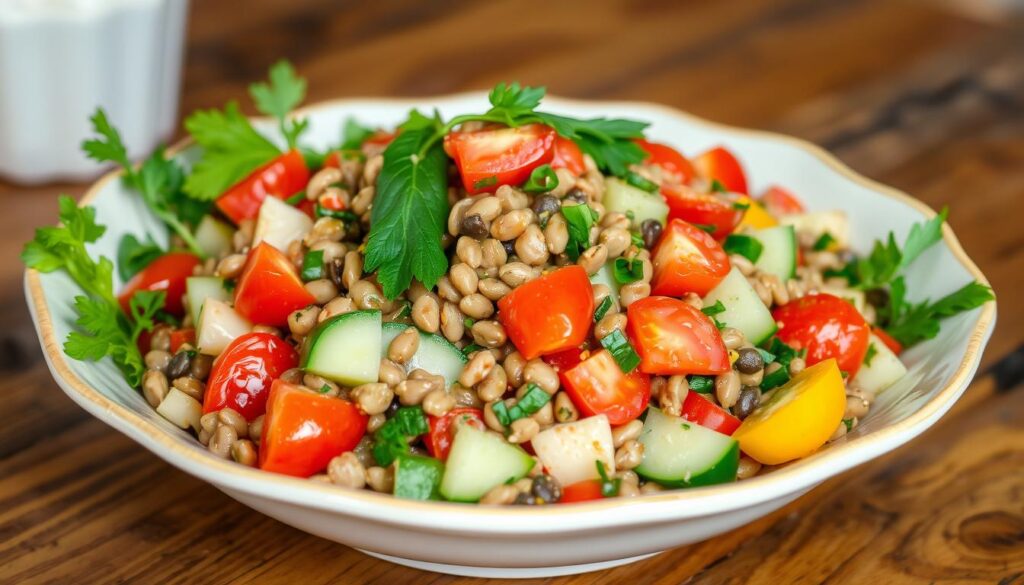
For those following a plant-based diet, legumes, tempeh, and lentils are fantastic protein sources. Legumes, including black beans, chickpeas, and kidney beans, are rich in protein and fiber, making them very filling and supportive of metabolic health. Lentils, in particular, are a powerhouse, offering 8 grams of protein and 8 grams of fiber per cup, along with essential minerals like iron, magnesium, and potassium. Tempeh, a fermented soy product, provides complete protein and probiotics that may support gut health and, by extension, metabolic function.
Spicy Natural Ingredients to Boost Metabolism
The right spices can not only add flavor to your meals but also enhance your metabolic rate. Certain spices have been researched for their potential to boost metabolism and support overall health.
Capsaicin and the Heat That Burns Calories
Capsaicin, found in chili peppers, is known for its ability to increase metabolic rate. Research from 2016 suggested that capsaicin can enhance the rate at which the body burns fat and uses energy. While the Academy of Nutrition and Dietetics notes that the effect might be temporary and not significantly impactful on its own, incorporating capsaicin through chili peppers or supplements could be beneficial.
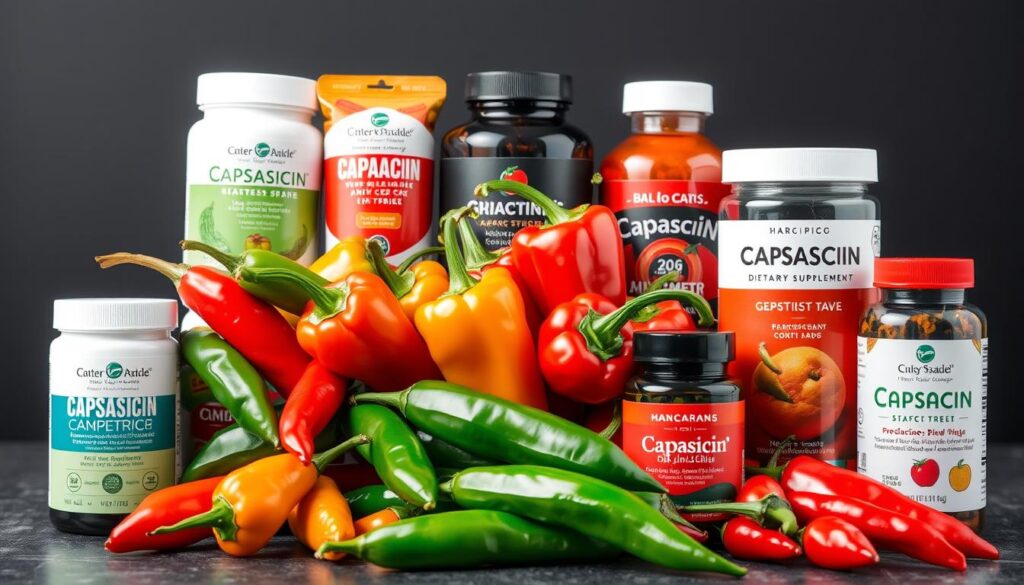
Other Metabolism-Boosting Spices
Beyond chili peppers, several other spices have been identified for their metabolism-boosting properties. Ginger, for instance, contains compounds called gingerols that can increase body temperature and metabolic rate, while also improving digestion. Cinnamon helps regulate blood sugar levels by improving insulin sensitivity, indirectly supporting metabolic health.
Other beneficial spices include turmeric, which contains curcumin that may increase metabolism and reduce inflammation, and black pepper, which contains piperine that can block the formation of new fat cells and enhance nutrient bioavailability. Additionally, cardamom is a thermogenic spice that may increase the body’s ability to burn fat, and mustard seeds have been shown to boost metabolic rate by up to 25% in some studies.
To reap the benefits, we can incorporate these spices into our daily diet through various dishes and beverages. While the individual effects may be modest, combining multiple metabolism-boosting spices and using them consistently can contribute to our overall metabolic health strategy.
Metabolism-Enhancing Beverages
Certain beverages have been shown to enhance metabolic function and support weight management. Incorporating these drinks into your daily routine can be a simple yet effective way to boost your metabolism.
Catechins and Caffeine Combination
Green tea is renowned for its metabolism-boosting properties, thanks to its high content of catechins and caffeine. The combination of these two compounds can enhance fat burning and improve overall metabolic health. When looking for the best green tea for metabolism, consider options that are high in catechins.

Caffeine’s Effect on Fat Burning
Coffee is another popular beverage that can aid in weight loss and enhance metabolic rate. The caffeine in coffee can increase fat burning and improve exercise performance. For those looking to use coffee for weight loss, choosing a brew that is high in caffeine and low in added sugars is advisable.
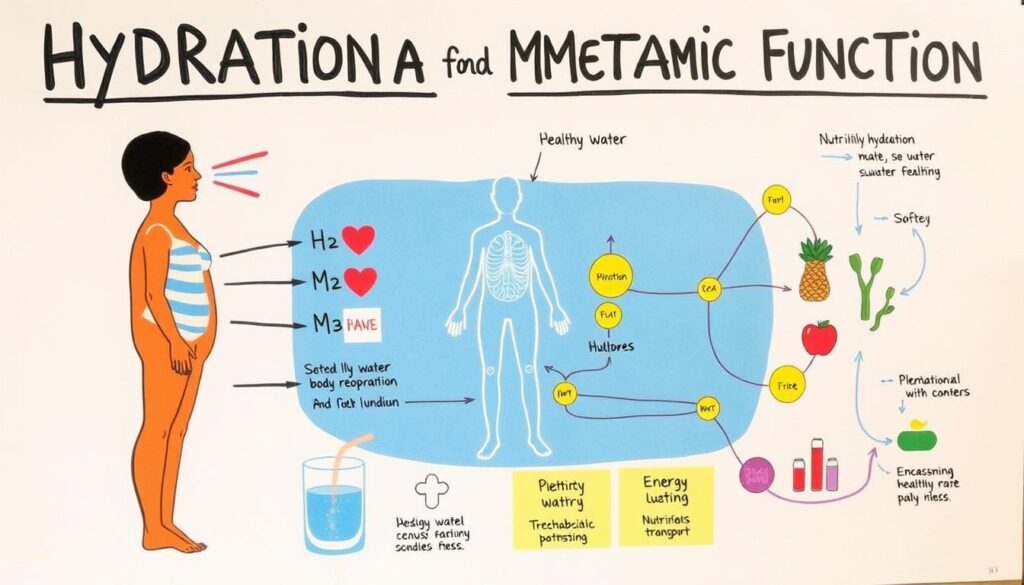
Water: Hydration and Metabolic Function
Water plays a crucial role in metabolic function. Even mild dehydration can slow down metabolism, leading to decreased energy expenditure and potentially weight gain. Drinking enough water can help maintain optimal metabolic rate and support overall health. Research suggests that drinking 500ml of water can temporarily increase metabolic rate by 24-30% for up to an hour.
Staying hydrated is essential for the body to function at its best. It is recommended to divide your weight in half to determine your target ounces of water per day. Drinking water before meals can also reduce calories intake by creating a sense of fullness, indirectly supporting weight management goals.
Fiber-Rich Foods for Sustained Metabolic Health
Fiber-rich foods play a significant role in supporting metabolic health and can be a valuable addition to your diet. These foods not only provide essential nutrients but also help in maintaining a healthy digestive system, which is crucial for overall well-being.
Oatmeal and Whole Grains
Oatmeal and whole grains are excellent sources of fiber, which can help in boosting your metabolism. Whole grains like brown rice, quinoa, and whole-wheat bread are rich in fiber and nutrients. Incorporating these into your diet can have a positive impact on your metabolic health.
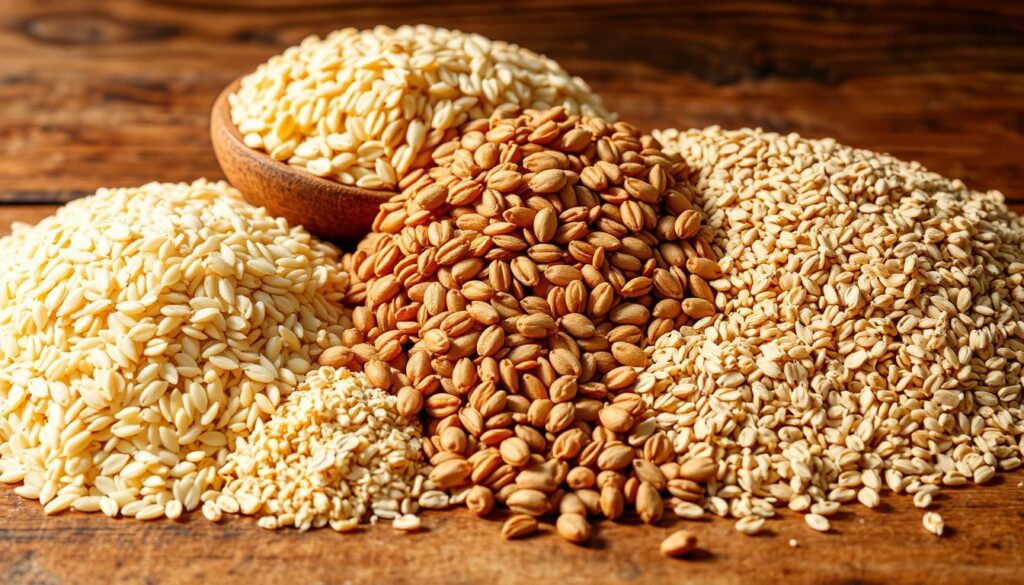
Berries and Fruits
Berries and fruits are not only delicious but also packed with fiber and antioxidants. They can help in supporting metabolic health by providing essential nutrients and fiber. Some of the best metabolism-boosting fruits include berries, apples, and citrus fruits.

Cruciferous Vegetables: Broccoli and Beyond
Cruciferous vegetables like broccoli, cauliflower, and kale are rich in fiber and nutrients. They support metabolic health through multiple mechanisms, including detoxifying harmful substances and supporting liver function. The fiber in these vegetables requires significant energy to digest, potentially increasing calorie burn.

Healthy Fats That Support Metabolic Function
Healthy fats play a crucial role in supporting metabolic function and overall well-being. Incorporating the right types of healthy fats into your diet can have a significant impact on your metabolic health.
Olive Oil and Monounsaturated Fats
Olive oil is rich in monounsaturated fats, which are known to improve insulin sensitivity and support metabolic health. Using olive oil as your primary source of fat can be beneficial due to its anti-inflammatory properties. Research has shown that monounsaturated fats can also aid in weight management by promoting feelings of fullness and reducing hunger.

Nuts and Seeds: Almonds, Walnuts, and Flaxseeds
Nuts and seeds are not only rich in healthy fats but also provide a powerful combination of protein and fiber. Almonds, for instance, are known for their ability to curb hunger due to their nutritional profile. Walnuts are particularly rich in omega-3 fatty acids, which may help reduce inflammation and improve insulin sensitivity. Flaxseeds contain lignans and alpha-linolenic acid (ALA) that may help regulate metabolism.
The combination of protein, fiber, and healthy fats in nuts and seeds requires significant energy to digest, contributing to the thermic effect of food and potentially increasing calorie burn. Despite their caloric density, regular consumption of nuts tends to be associated with leaner body mass, likely due to their satiating effects and potential impact on metabolism.
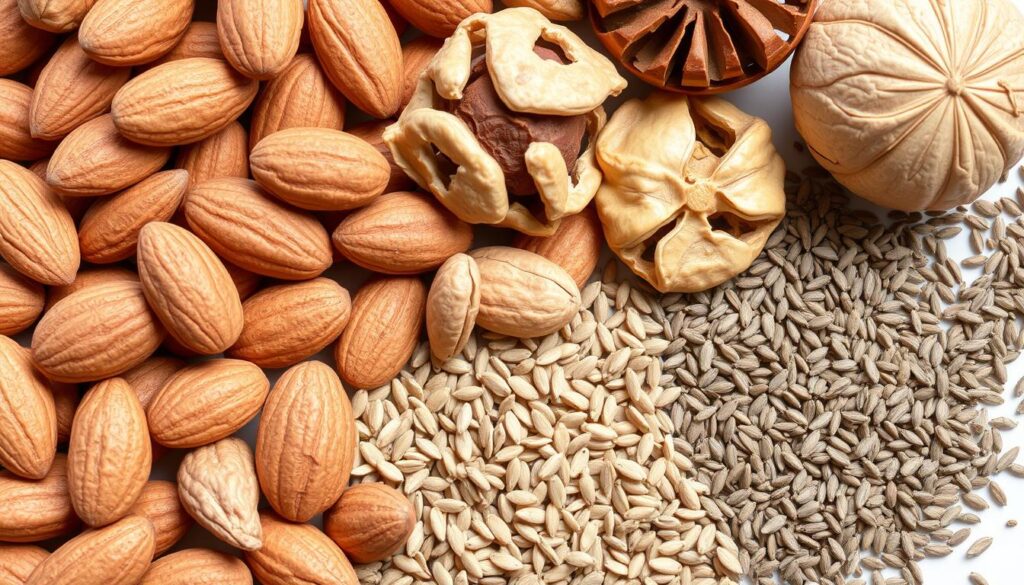
For maximum benefits, it’s recommended to consume nuts and seeds in moderation, generally 1-2 ounces daily. Proper storage is also crucial to preserve the delicate oils in these foods.
Lifestyle Factors That Complement Metabolism-Boosting Foods
A well-rounded approach to improving metabolism involves not just diet, but also specific lifestyle changes that support metabolic health. While we’ve discussed various foods that can boost your metabolism, it’s equally important to consider the lifestyle factors that complement these dietary changes.
Strength Training and Muscle Mass
Engaging in strength training exercises is crucial for building muscle mass, which in turn can significantly boost your resting metabolic rate (RMR). As we age, we naturally lose muscle mass, leading to a decrease in RMR. By incorporating strength training into your routine, you can counteract this effect and maintain a healthier metabolism.
High-Intensity Interval Training (HIIT)
High-Intensity Interval Training (HIIT) involves short bursts of intense exercise followed by brief periods of rest. This type of training has been shown to be highly effective in improving metabolic health by increasing your body’s caloric expenditure both during and after exercise.
Sleep Quality and Metabolic Health
Sleep plays a vital role in regulating metabolism, hunger, and appetite. Research has shown that insufficient sleep can lead to a lower metabolic rate and increased levels of ghrelin, the hormone that stimulates appetite, while decreasing leptin, the hormone that signals fullness. Ensuring adequate sleep is essential for maintaining a healthy metabolic balance.
| Lifestyle Factor | Impact on Metabolism |
|---|---|
| Strength Training | Increases muscle mass, boosting resting metabolic rate |
| HIIT | Enhances caloric expenditure during and after exercise |
| Sleep Quality | Regulates hunger hormones and metabolic rate |
By incorporating these lifestyle factors into your daily routine, you can create a comprehensive approach to supporting your metabolic health. 
Conclusion: Creating Your Metabolism-Boosting Plan
As we’ve discovered, certain natural ingredients and lifestyle factors can significantly impact your metabolic health, paving the way for a healthier you. To boost metabolism and support overall health, it’s essential to adopt a holistic approach that incorporates dietary changes and lifestyle modifications.
Incorporating protein-rich foods, spicy ingredients, and metabolism-enhancing beverages into your daily routine can have a significant impact on your metabolic rate. Combining these dietary changes with regular exercise, such as strength training and HIIT workouts, can further support your weight loss journey.
By making small, daily habits a part of your routine, such as starting your day with green tea and staying properly hydrated, you can experience cumulative effects on your metabolic health and overall energy levels. We encourage you to reach out to CoWrit Technologies Inc via WhatsApp at +44-7822010953 for personalized guidance on creating your metabolism-boosting plan.


